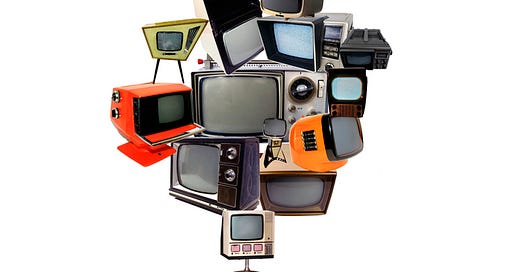Once upon a time, public television was the gold standard. It gave us the majestic Masterpiece Theater, the searing truth of Frontline, and the radical intimacy of POV. It stood apart. No ads, no gimmicks. Just intelligence, substance, and storytelling that respected the viewer.
I should say up front: this isn’t just a media rant for me.
My father, Ward Chamberlin, was one of the original architects of public television.
He helped build it from the ground up—serving as one of the founders of the Corporation for Public Broadcasting, then PBS, and later leading flagship stations like WNET in New York and WETA in Washington.
He didn’t just believe in public television’s mission—he fought for it. Fought to air bold, politically charged series when others wouldn’t touch them. He championed independent voices, poured energy into nationally distributed investigative programming, and was instrumental in bringing Ken Burns’ early documentaries to PBS when “a national audience” still meant something.
So, am I being disloyal when I ask: Has public television lost its way?
But maybe that’s exactly why I need to ask it. Because I remember what it was like when public television had nerve.
Today, it feels... safe. Predictable. Beige.
Public television used to be the antidote to ratings-chasing commercial media. But now, in its effort to survive—clinging to aging fundraising models and programming that plays it safe—it’s slipping into irrelevance. Stations are stuck catering to an older donor base, afraid to challenge or change. Others are so focused on pleasing funders that any sense of editorial boldness has been quietly filed away.
The pledge drives still run like it’s 1995. The tote bags, mugs, and "2-for-1 tickets to Celtic Thunder" offers keep coming. Meanwhile, the digital experience—meant to modernize things—is just as dated. PBS Passport, the streaming service for donors, is confusing, clunky, and frustrating to navigate. Compared to Netflix, Hulu, or even YouTube, it feels like a loyalty test wrapped in a paywall rewarding the already converted.
But younger audiences aren’t watching. They’re on platforms where bold, independent storytelling still exists—just not on PBS. Streaming giants have eaten public television’s lunch, while POV, once a career-launching, conversation-starting powerhouse for independent filmmakers, now barely registers in the broader cultural conversation.
Meanwhile, public television is under renewed political and financial scrutiny. Lawmakers are once again questioning the value of federal funding. Viewership is fragmented. Trust in media is eroding. And the very idea of a publicly funded national platform for smart, fearless content is hanging by a thread.
This isn’t about nostalgia. It’s about relevance.
Public television doesn’t need a rebrand—it needs a reckoning.
What is it for now? Who is it trying to reach? What risks is it willing to take to stay culturally alive?
Because if no one is willing to fight for its future, we risk losing more than just a network. We lose one of the last remaining spaces built to serve the public interest—without commercial agenda, without algorithmic curation. And we lose the belief that smart, challenging, inclusive programming can and should be available to everyone.
And frankly, I don’t know who’s fighting for that anymore.
If you’re thinking about branding, chances are you don’t need the whole agency shebang. All you need is a little Brand Therapy.
Brand Therapy is branding reimagined – pared down to its most powerful parts—no big teams, no endless deliverables, no timelines that drag on forever.
I’m the brand therapist you call when you’re done playing it safe and you're ready for the world to see you for who you actually are. With a ton of brand experience, I'll get you straight to the good stuff: your story, your visibility, your clarity.






Hi Charlotte -- yes, I guess I was. I've been thinking about writing it for some time now. Was on the fence about calling out something I have so much admiration for and history with at a time when it's under fire. But it just kills me that it is where it is today.
Well said, Lyn. Your personal insight makes this even more believable than a straightforward argument on PBS' merit. Readers believe someone who grew up with the platform, so to speak. Let's hope the Powers That Be at PBS pay attention!